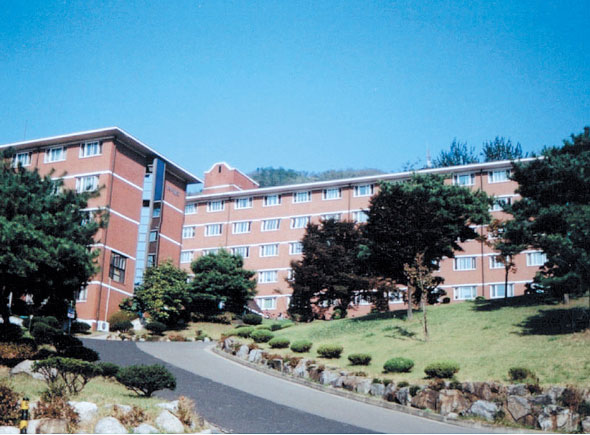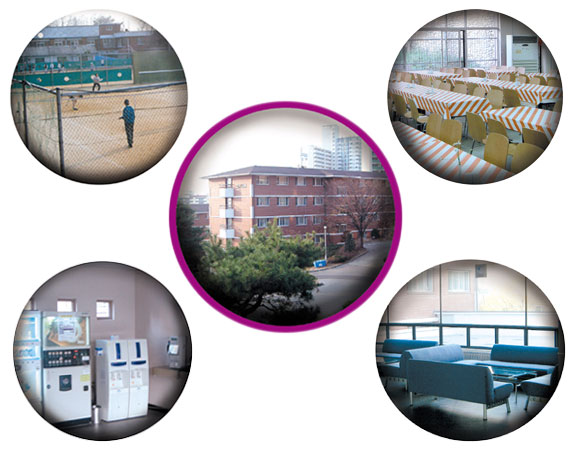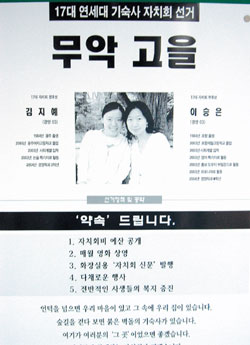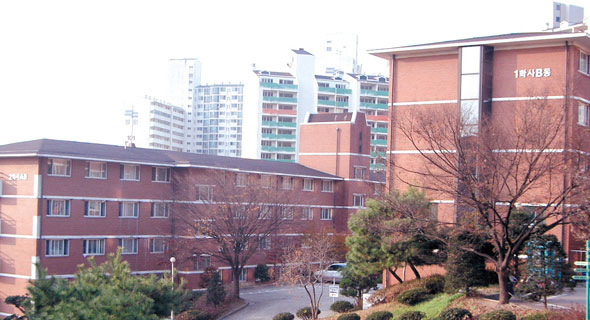Analyzing the conditions of the Muak Dormitory
 | ||
However, living in the Muak Dormitory does not seem to be as wonderful as students think. Many boarders are expressing their complaints on the homepage ( http://www.yonsei.ac.kr/~ housing). These complaints show the faults of either the authorities or students, or both. As the year 2004 ends, analyzing the actual conditions of the Muak Dormitory and finding a solution to several problems is necessary for a better life of boarders in the school dormitory.
General introduction to the Muak Dormitory
The dormitory of Yonsei Univ., the Muak Dormitory, consists of four units, eight buildings, and a total of 9,765 pyeong(a unit of area). The first building was constructed in October, 1989, and the second was built on Aug. 18, 1993, including a restaurant used by every dormitory student. About 996 undergraduate students who live in any districts except Seoul and general graduate students, live in the first and second dormitory. The third was constructed in August, 1998, sponsored by a donation fund from the Alumni of Col. of Medicine, Dentistry, and Nursing. About 568 students from the Col. of Medicine, Dentistry and Nursing live in the third dormitory. The fourth was constructed recently, in May, 1998, and about 276 students who are preparing for the state examinations live in building A of the fourth and foreign teachers are in B of it.
Inside the Muak Dormitory, there are several facilities for promoting boarder's welfare: a restaurant, a store, computer rooms, resting places, laundries, and public shower rooms. Especially in the third and fourth, there are the exclusive reading rooms and special lecture rooms to help student's studies.
To enter the first and second building, students can apply in early December, and newly accepted freshmen in early February. Students who missed a chance to enter the first and second building have another opportunity in summer, from late August to early September, and anytime when rooms are empty, the dormitory authorities announce the enrollment. The applicants of the first and second dormitory are chosen by lottery at random. In contrast to them, the students who want to enter the third and fourth are chosen by the authorities of each college department.
Complaints of boarders 
▲ The Muak Dormitory and facilities.
The authorities explain that the facilities are the best among private universities in Korea.
The problem of meals is very sensitive to any society, and boarders of the Muak Dormitory are not an exception. In 2004, the dormitory authorities made students buy more than 40 meal tickets per student as a duty. Since the system did not exist before 2004, many boarders complained about this measure. According to a survey about the Muak Dormitory, answered by 137 boarders from Nov. 12 to 14, 41.6% of them responded they are most dissatisfied with the quality of food. About the question, What is the most satisfactory factor in life at the Muak Dormitory?, nobody answered the quality of food is the best. "Compared to the fee, the quality of food is not satisfactory. Neither is the menu diverse," says Choi Jong-hyeok (Fresh., Area of Liberal Arts).
About these problems of the dormitory restaurant, the dormitory authorities say it is unavoidable to maintain the restaurant. After adapting the obligatory meal ticket system, loss to the dormitory finance has been reduced by half. Actually, the current system is not perfectly obligatory, according to Han Tae-jun, Department Manager of Housing Office. "Korea Univ., for example, is adapting the perfect obligatory meal ticket system. Students in the dormitory of Korea Univ. have to buy 120 meal tickets in one semester," says Manager Han. Regarding this system, boarders of the Anam Dormitory in Korea Univ. have discussed the pros and cons. "Though understanding the dormitory authorities' way of managing the restaurant, I think a guarantee of boarders' self-control is needed," says Jun Jung-in (Soph., Dept. of Sociology, Korea Univ.).
If the Muak Dormitory authorities adapt this system such as that of Korea Univ., the authorities can first secure the expenses of operating the restaurant. If they sell more than 40 meal tickets per student, the condition of food would be improved. However, reflecting on students' opinions to some degree, they set the standard at 40 units. Another reason that the authorities enforce meal ticket sells is that they cannot estimate the daily demand on the dormitory restaurant without that system. "Before this year, it was hard to decide how many meals we should prepare. After selling 40 meal tickets to boarders, it was much easier than before and we could secure the budget well. Yet it is still hard to predict the demand," says Manager Han.
 | ||
| ▲ The campaign poster of the candidate of the Committee of Self-government at the Muak Dormitory | ||
After clearing 30% of rooms out in the summer vacation, other parties stayed in those places, who participated or visited the events concerning Yonsei Univ. While they were staying in the dormitory, the original boarders complained about the noise and disturbance. When asked What do you think about the noise and disturbance caused by foreign students during last summer vacation?, 43.8% of the boarders responded it that they were dissatisfied, and 16.8% said they understood. Lee Jae-ha (Jr., Dept. of Theology), who has been the dormitory for about three years experienced the situation every year. "First when I was a freshman, I expected to be with foreign students to learn English. Yet they act as they are in their own room, making excessive noise at midnight and drinking a beer." On the other hand, Manager Han says, "When the school authorities have an opportunity to hold an international event or chance to advertise Yonsei out to the world, we have to offer rooms for participants when they need them. I know the domestic students' complains, but I hope they try to understand other cultures and people a little bit. We are trying to shape a policy considering students' demand as best as we can." Yet students do not agree with the authorities' thought. "There are problems which we can bear and those we cannot. Their behavior is an unrighteous act. The authorities have to regulate foreign students powerfully," says Lee.
Then, are boarders' dissatisfaction and complaints dealt with properly at present? When asked Do you think your complaints are dealt with properly by the dormitory authorities?, only 17.5% of the boarders responded positively. Besides, the Committee of Self-government at the Muak Dormitory does not play a role is helping boarders and improving the facility. Although the campaign for the chairman began from November, few students take attention to them and it shows students' dissatisfaction to the Committee.
Opinion of the authorities and students about each other 
▲ The meal ticket of the Muak Dormitory restaurant
One of the biggest students' dissatisfaction concerns the Internet. Students say the network in the dormitory buildings is so unstable, worse than any other buildings in campus. As a countermeasure of this problem, the Office of Information Systems operated "Giga-bit Network," the construction works to improve the network system in Shinchon campus. As a result, the inner network system has become more stable at the dormitory as well. Yet recently, students have been expressing their grievances about a computer virus. Besides, sometimes the Internet still makes problems and even stops abruptly.
However, a staff member of the Dept. of Network Management of Office of Information Systems says the main problem is students' carelessness. "In a large aggregate such as the dormitory, since one virus in a personal computer potentially influences the whole, individual precaution and care is very important. When we chase some IP (Internet Protocol), we can find a virus and vicious code spread all over the campus through them." Although the Office of Information Systems offers a service to download a virus vaccine program, few students know this. Even when the emergency situation happens, the Office of Information Systems sends a message to the dormitory authorities to prepare for the expected bug. "Constructing the network device is limited. If we can reduce the working hours and money involved in watching the virus in each personal computer, there will be more room to establish the device." The dormitory office, also warns there is a possibility to break users' networking which spreads viruses. "A specified minority makes the Internet environment of the dormitory worse. If they do not take care of their computers, we will have to restrict their connection to the Internet someday," says Manager Han.
Manager Han, who has been working in the Muak Dormitory for about four years, is feeling the lack of student's community spirit. "It seems that students in these days are so unsociable. I hope they think of the dormitory life as a chance to live together." Not only is the relationship between the authorities and students, but also that between each student is important. When the boarders have more community spirit than now, life will be improved and it will be a chance to make the dormitory more developed.
Students also want an active dormitory. "It seems the Committee of Self-government at the Muak Dormitory has done little. To make an energetic community, their activity should be strengthened," says Choi Jong-hyuk.
 | ||
Small Yonsei Univ.
The Muak Dormitory is a small Yonsei community in Shinchon campus. It seems that the relationship between the authorities and students is not so bad. "The dormitory authorities try to improve students' living, and it seems the food in the restaurant has become better than in the spring semester of this year. They are trying to do their best in their own way, I think," says Hong Yong-cheol. Most boarders who have lived in the Muak Dormitory more than three semesters say many matters changed in 2004; more than before. Making a comfortable dormitory is the work of not only the authorities or boarders, but both. Improvements at the dormitory will only move forward as a result of such a cooperative spirit.

